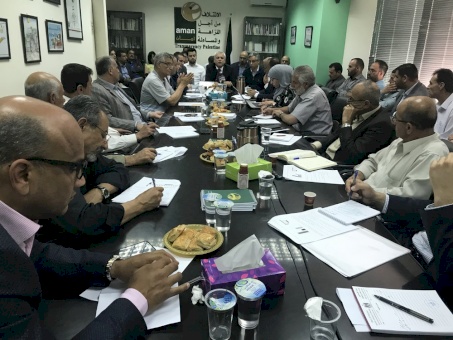
In a Hearing Held by "AMAN" with the Chairman of Land and Water Settlement Commission
Judge Musa Shakarneh, Head of Land and Water Settlement Commission and Acting Chairman of Land Authority, indicated that the Land Settlement Commission has made great progress in terms of achievements compared with the age of the Commission and the available financial and human resources. He pointed out that the Commission is in the process of developing its cadre which will contribute to solving achievement-related problems in some areas, calling for the need to build partnerships and improve coordination between the various stakeholders working in land planning and organization.
The discussion took place in a hearing conducted by AMAN Coalition attended by representatives of ministries, public institutions, village and municipal councils as well as civil society organizations. The meeting was opened by the Chairman of AMAN Coalition’s Board of Directors Mr. Abdul Qader Al-Husseini, who expressed appreciation for the Commission’s response to AMAN’s invitation. Al-Husseini pointed out the extreme importance of the draft settlement project in all national, economic and social respects as a national project aims at consolidating the right of citizens and strengthening their steadfastness on the ground by asserting their ownership, in addition to the importance of land planning in the development process. For her part, the Director of the Accountability and Advocacy Unit at AMAN Coalition Hama Zaidan presented a paper on land settlement in which she stating that the hearing aims to answer the questions raised by citizens about the various procedures and mechanisms adopted by the Commission in the settlement process, as well as the settlement plans and methodology applied in the process in the different areas. She explained that the hearing also aims at enhancing the right of citizens to access information from reliable sources.
Distinguished judge Shakarneh presented the historical context of the settlement project over one hundred years, mentioning the huge benefits of the settlement process in the political framework, land protection and the reduction of land ownership illegal transfer. He pointed out that over the past years, the occupation continued to invent methods to seize the land, while the Palestinian Authority abided by the agreements that limited its ability to work, plan and organize in area C.
Shakarneh explained the extreme importance of the settlement project in economic and social aspects, pointing out the contribution of the settlement to the development of investment and ensuring its stability and sustainability. He also indicated the sensitivity of this file in the Palestinian context for the importance of land to the citizen, pointing out that a big number of court cases are related to land disputes. He also talked about the importance of land settlement in the planning process of infrastructure and public projects.
Judge Shakarna confirmed that the emerging Commission has achieved much progress over the past few years as it so far completed about 35% of land settlement, noting that 3.6 million Dunoms are still not covered by the settlement process. He added that the Commission has developed its human resources in terms of quantity and quality, but the financial resources are low and do not meet the work size of the Commission and its plans.
Judge Shakarna has highlighted a number of challenges facing the Commission's work, particularly the shortage of financial resources opposed to the settlement project and it increasing requirements. At the same time, Judge Shakarna called for the appointment of further employees, noting that the Commission has increased the number of its staff, but the need is increasing for every new announcement of settlement in a certain area. The judge also said that it is necessary to make amendments to the law as such amendments would improve the Commission’s work. In addition, it is necessary to hire settlement judges as soon as possible, which will contribute to increasing the efficiency of the Commission in managing the objections and other affairs.
Many questions and comments were raised by institutions and attendees focused on the importance of activating and increasing the coordination between the Commission and other ministerial institutions, especially with regard to the management of government land files. It was also recommended to identify the settlement areas based on plans and priorities rather than requests from municipalities. The attendees have also recommended that it is important to work in area C for being the most vulnerable to seizure and confiscation by the occupation.
The representatives of several municipalities expressed their concern about the delay of the project in their districts, stressing the need to increase the size of employees and workers and to increase the Commission’s contribution to ensure the quick completion of the settlement work. Representatives of several civil society organizations also emphasized the importance of coordination between the Commission and the institutions to raise the citizens' awareness on the strategic importance of the settlement project. Shakarna also pointed out that the file of land settlement is one of the most files that are likely to have corruption suspicions and conflict of interests, which the Commission is following up on daily basis.
Judge Shakarneh confirmed that the Commission has developed its means of communication with institutions and citizens, but there is a need to systemize this process to include a broader framework of institutions and citizens. He also mentioned the challenges facing the work of the Commission that are related to many internal and external factors and the necessity to solve them in order to engage the citizen in the monitoring and accountability of the settlement process in all stages because this would restrict the corruption in this sensitive file.
The meeting was attended by representatives of the Ministry of Agriculture, Wall and Settlement Resistance Authority, Palestinian Central Bureau of Statistics, Capital Market Authority, General Personnel Bureau, the Legal Opinion and Legislation Bureau, Ministry of Transportation, Directorate General of Property and a number of media professionals, municipalities and civil society organizations.
